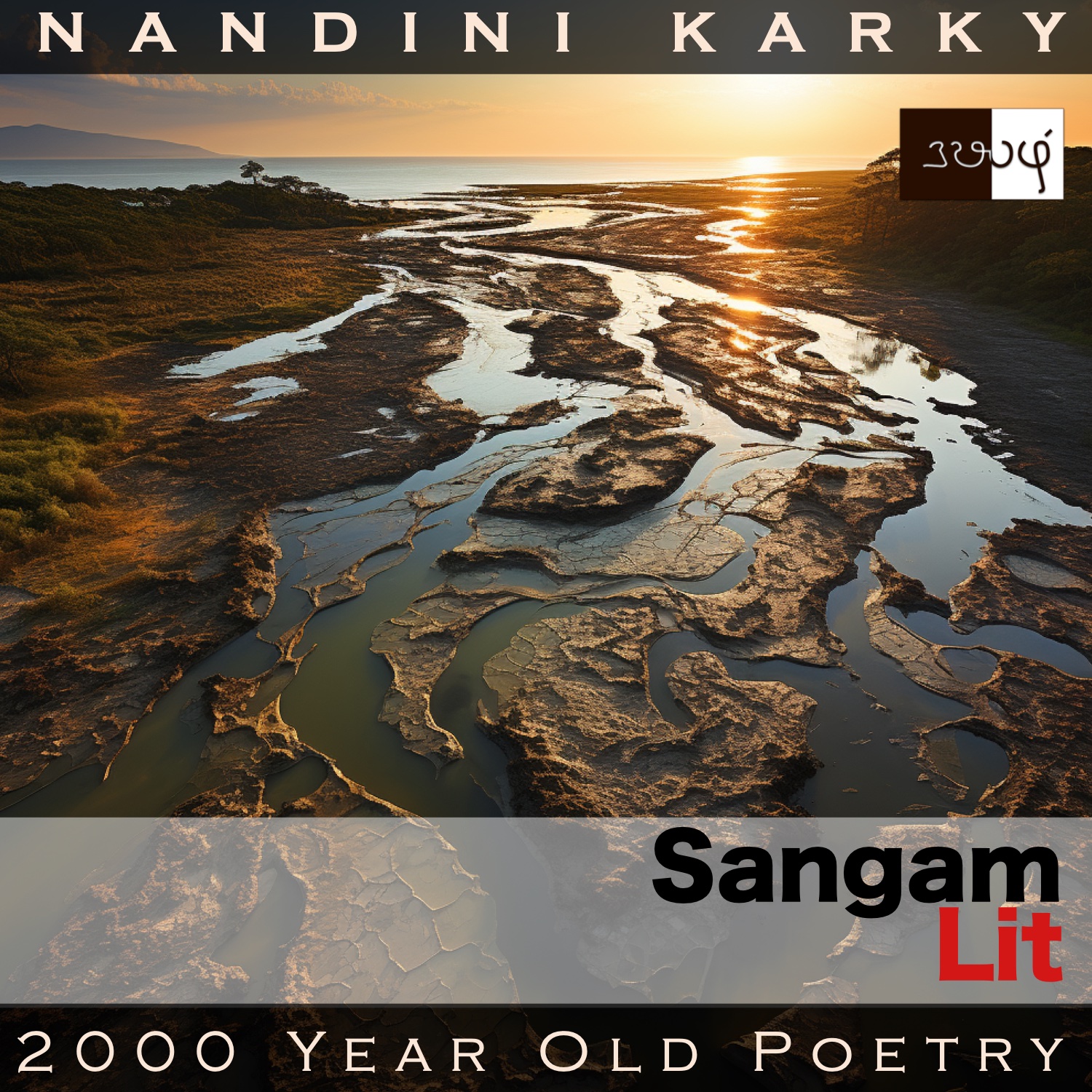Podcast: Play in new window | Download
Subscribe: Apple Podcasts | Spotify | Amazon Music | Android | iHeartRadio | TuneIn | RSS | More
In this episode, we perceive the disappointment and distress of a poet, as depicted in Sangam Literary work, Puranaanooru 237, penned about the Velir King Velimaan’s brother Ila Velimaan by the poet Perunchithiranaar. The verse is situated in the category of ‘Pothuviyal Thinai’ or ‘Common themes’ and reveals events that affected the poet after the king’s death.

‘நீடு வாழ்க’ என்று, யான் நெடுங் கடை குறுகி,
பாடி நின்ற பசி நாட்கண்ணே,
‘கோடைக் காலத்துக் கொழு நிழல் ஆகி,
பொய்த்தல் அறியா உரவோன் செவிமுதல்
வித்திய பனுவல் விளைந்தன்று நன்று’ என
நச்சி இருந்த நசை பழுதாக,
அட்ட குழிசி அழல் பயந்தாஅங்கு,
‘அளியர்தாமே ஆர்க’ என்னா
அறன் இல் கூற்றம் திறன் இன்று துணிய,
ஊழின் உருப்ப எருக்கிய மகளிர்
வாழைப் பூவின் வளை முறி சிதற,
முது வாய் ஒக்கல் பரிசிலர் இரங்க,
கள்ளி போகிய களரிஅம் பறந்தலை,
வெள் வேல் விடலை சென்று மாய்ந்தனனே:
ஆங்கு அது நோய் இன்றாக; ஓங்கு வரைப்
புலி பார்த்து ஒற்றிய களிற்று இரை பிழைப்பின்,
எலி பார்த்து ஒற்றாதாகும்; மலி திரைக்
கடல் மண்டு புனலின் இழுமெனச் சென்று,
நனியுடைப் பரிசில் தருகம்,
எழுமதி, நெஞ்சே! துணிபு முந்துறுத்தே.
In the previous Puranaanooru verses, we have seen how this poet went seeking with hope to King Velimaan but found him on his death bed. Even then, the king instructs his younger brother to do all possible for the poet. However, Ila Velimaan fails to honour the last wishes of his brother and offers gifts not worthy of the poet’s stature. In this situation, the poet renders these words:
“Nearing his tall gates, I sang ‘May he live long’ in that day of deep hunger, and thought, ‘He is the strong king who knows not lying, who is always a thick shade in the scorching summer. These seeds of words, I plant in his ears will bloom well’. Ruining those wishes, as if a cooking pot had nothing to offer but a burning fire, without thinking the supplicants are to be pitied, and without letting them eat, unjust Death has dared without consideration. And so, abandoned by fate, his royal women beat their breasts and cry, even as bangles scatter akin to plantain flowers. Leaving wise supplicants with kith and kin in despair, the young lord with a white spear has departed to the vast space of the drylands, decked with cactus, and disappeared;
May Death be without disease! If the elephant prey that a tiger was stalking in the soaring mountains escapes, the tiger won’t seek a mouse; Akin to how a silt-filled stream journeys to find the sea with soaring waves, let us seek those who would give abundant gifts. Rise, O heart, with clarity!”
Let’s explore the hidden nuances here. The poet recollects what he thought when he approached King Velimaan’s palace. It was a time of hunger and want for this poet and he seems to arrived with much hope that his words would be well received by the king, famous for being benevolent, like a huge tree offering shade in summer, and he sang wishing for a long life for this king. Following this account of his wish, the poet turns to the reality of what happened. To describe that, he brings forth a striking simile. The poet asks us to imagine a person coming upon a cooking pot and when the person puts their hands inside hoping to find rice to quench their hunger, they find that all it contains is fire that scorches their hands. In that way, unjust Death, who had no thought or pity about famished supplicants like himself, made the young king depart forever to the burial grounds of the drylands filled with cactus. This parting away of the king is reiterated by the sound of royal women beating their chest and shattering their bangles. This custom of women lamenting in this way continues till today in the villages of Tamilnadu and the dirge they sing at these times is called ‘Oppari’.
After revealing the rejection of his hopes in a tangible way with evocative similes and scenes, the poet in the custom of Sangam times, wishes that Death, even though it has caused such pain to him, should live well. He then brings forth another metaphorical scene from the wild, wherein we see how a tiger has marked an elephant as its prey and is lying in wait for it, but somehow that elephant escapes. Now, will the tiger say, ‘I couldn’t fell the elephant. I’ll settle for a mouse’? Never, the poet answers implicitly and nudges his heart to move on, as a silt-filled stream of river would journey to the roaring sea, to better prospects who would render abundantly. In this metaphor about the tiger’s expectation of an elephant and question about settling for a mouse, the poet implies that he had coming in hopes of receiving the grace of King Veliman but instead he was offered paltry gifts by the king’s brother Ila Veliman. And so, heavy though he feels, like a silt-laden river, he would not settle for anything less than the sea of abundance, the poet declares with conviction! From the simile of the cooking pot and onward to the metaphor of the tiger not settling for a mouse and finally with the comparison of a river carrying silt determined to find the sea, the poet traces the trajectory of his emotions, starting with disappointment, and then, realisation of his worth, and finally, optimism in finding a better future, and thus, reveals to us, a path that can lead us out of any despair and help us journey on with positivity!




Share your thoughts...